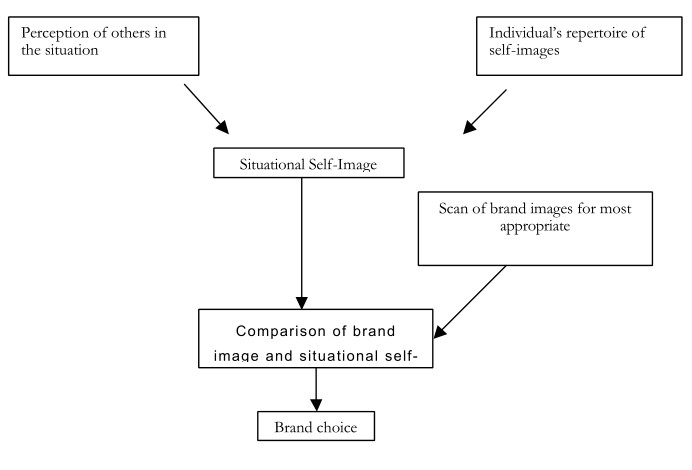In consumer research, it is argued that consumers’ personalities can be inferred from the brands they use, from their attitudes towards different brands and from the meanings brands have for them. Consumers have a perception of themselves and they make brand decisions on the basis of whether owning or using a particular brand which has a particular image, is consistent with their own self image. They consider whether the ownership of certain brands communicates the right sort of image about themselves.
Brands are only bought is they enhance the conception that consumers have of themselves, or if they believe the brand’s image to be similar to that which they have of themselves. Just as people taken care choosing friends who have a similar personality to themselves, so brands, which are symbolic of particular images, are chosen with the same concern. As brands serve as expressive devices, people therefore prefer brands whose image is closest to their own self-image.
One of the facts that we know from our own experience is that one of the purpose of buying and using particular brands either to maintain or to enhance the individual’s self-image. By using brands as symbolic devices, people are communicating certain things about themselves. Most importantly, when they buy a particular brand and receive a positive response from their peer group, they feel that their self-image is enhanced and will be likely to buy the brand again. In effect, they are communicating that they wish to be associated with the kind of people they perceive as consuming that particular brand.
There is considerable amount of research supporting this idea of the self-concept, based on research in product fields such as cars, cleaning products, leisure activities, clothing, retail store loyalty, electrical appliances and home furnishing. Several studies have looked at car buying and have shown that the image car owners have of themselves is congruent with the image of the marquee of car they own. Owners of a particular car hold similar self-concepts to those they attributed to other consumers of the same car. Also, if the car purchaser’s self-image is dissimilar to the image they perceive of different brands of cars, they will be unlikely to buy one of these brands.
To check whether an appreciation of self-image as an indicator of buying is as useful for conspicuously consumed brands as it is for privately consumed brands(conspicuous consumption) and magazine brands(private consumption). In both of these product fields, people chose brands whose images came closest to matching their own self-concepts. What this study also showed was that for less conspicuously consumed product fields actual, rather than ideal self-image appeared to be more strongly related to brand choice.
There has been a lot of debate about which type of self- concept (actual or ideal) is more indicative of purchase behavior. To understand this better, a study was designed which looked at nineteen different product fields ranging from headache remedies, as privately consumed products, through to clothes, as highly conspicuously consumed products. There was a significant correlation between the purchase intention for the actual and ideal self-concept results. This indicated that both are equally good indicators of brand selection.
However, the behavior of individuals varies according to the situation they are in. take your own case, the brand of beer bought for drinking alone at home in front of the television is not necessarily the same as that bought when out on a Saturday night with friends. Situational self-image-the image the person wants others to have of them in a particular situation – is an important indicator of brand choice. According to the situation, the individuals match their self-image to the social expectations of that particular group and select their brands appropriately. The impact of situation on brand choice can be modeled as shown in the figure-concept results. This indicated that both are equally good indicators of brand selection.

Finally, it needs to be realized that there is an interaction between the symbolism of the brand being used and the individual’s self-concept. Not only does the consumer’s self image influence the brands they select, but also the brands have a symbolic value and this in turn influences the consumer’s self- image.

